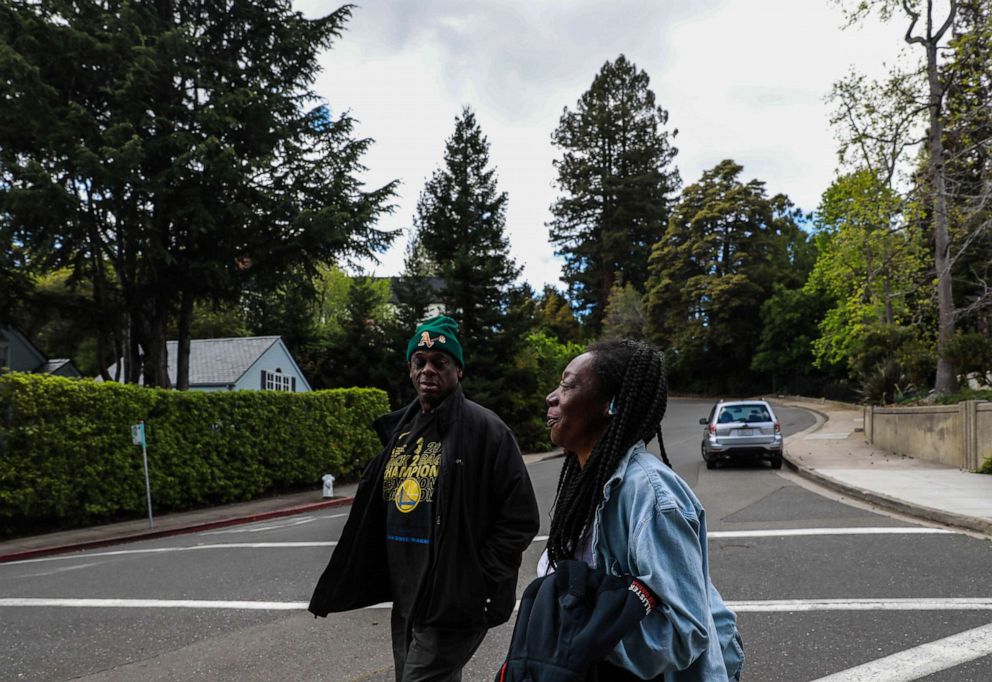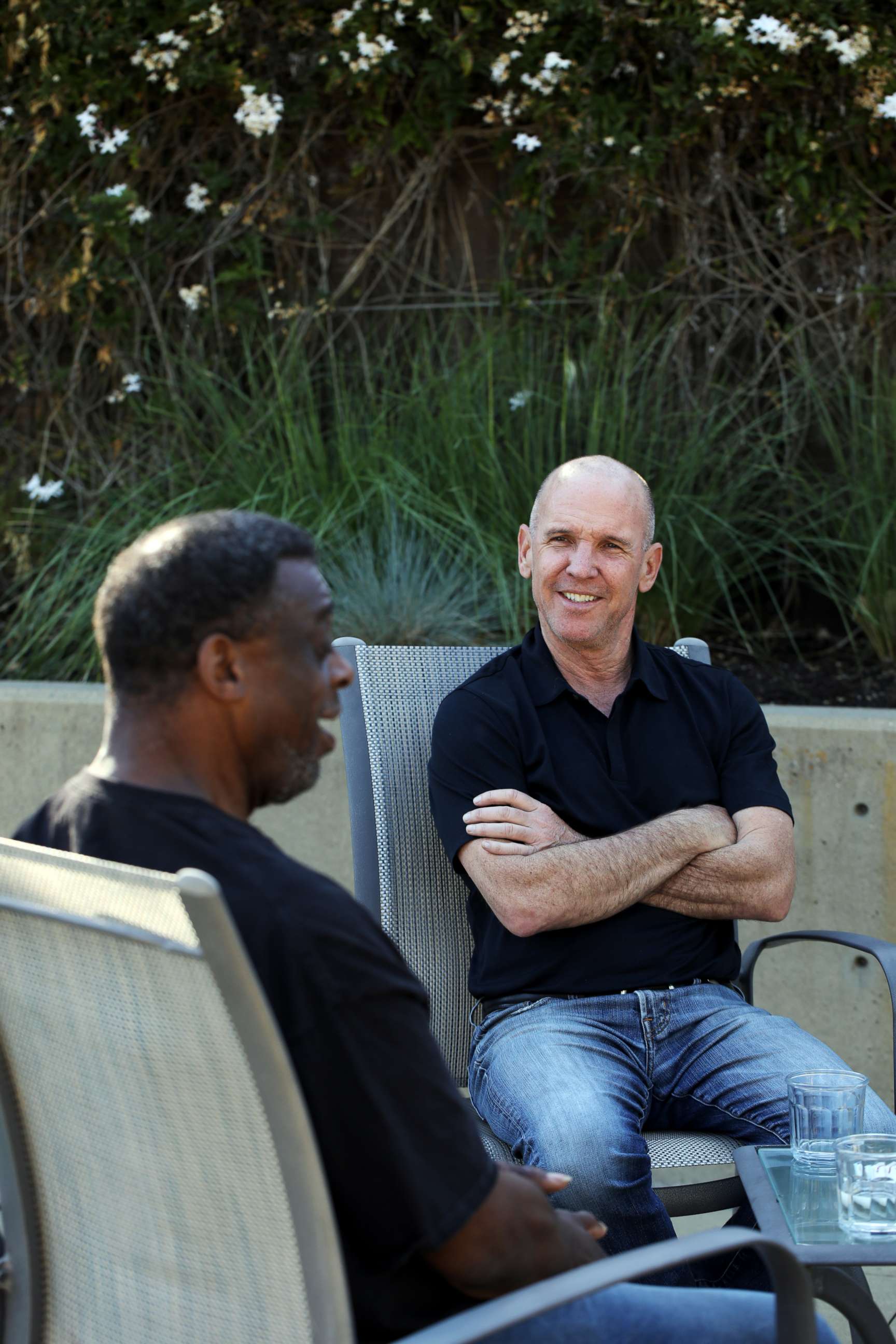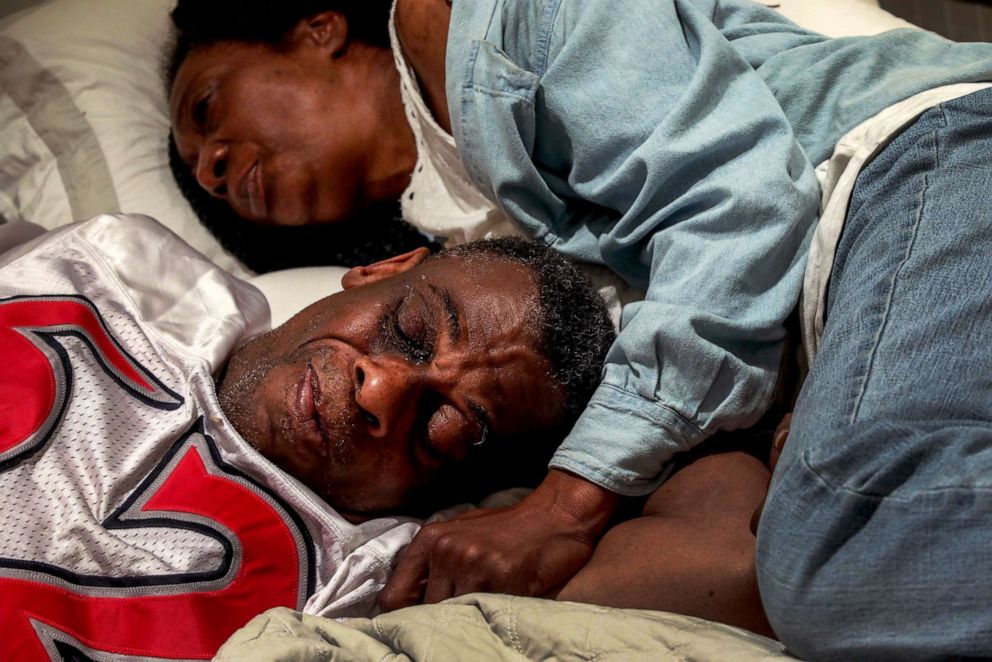Why one California resident opened his $4M home and heart to a homeless couple
Greg Dunston and Marie Mckinzie moved into Terry McGrath's Piedmont home.
After 10 years of living on the streets in Oakland, California, Greg Dunston and Marie Mckinzie have a new normal thanks to a generous Bay Area homeowner who wanted to improve their lives and share the message that homelessness is not "contagious."
The pair now live in a $4 million mansion in the upper-class East Bay neighborhood of Piedmont with Terry McGrath, who was determined to commit a simple act of kindness after a story was published about them in the San Francisco Chronicle.
When asked if they were worried about adjusting to life in a house, Mckinzie said "absolutely not."
"I don't want to live on the streets. A lot of people do, but I want to get in," she added. "I love to cook a lot so I wanted a kitchen, bed and shower."
"We wanted to do that," Dunston said about moving into McGrath's home. "There are a lot of people out on the streets but they have no choice."

But their "moving on up” tale of humanity was initially met with both positive and negative attention from local reporters and nearby residents.
Watch the full story on "Nightline" TONIGHT at 12:35 a.m. ET
One neighbor who was unaware of the situation called 911 and told dispatchers, "I just pulled into the driveway and there's some strange folks hanging around the house."
Another called Piedmont Police and Fire Dispatch, saying, "I just wanted to notify you that this woman is sitting at Lexford and Hampton ... She's smoking a cigarette -- could be drugs."
The couple has put a face on the growing homeless crisis in San Francisco.
The city by the bay is the wealthiest in the nation with more billionaires per capita than any other city in the country, according to the Wealth-X Billionaire Census 2019. San Francisco's homeless population has also hit a record high, with nearly 8,000 people living on the street and in their cars.
Otis Taylor, a journalist for the San Francisco Chronicle who writes about homelessness in the Bay Area, has detailed the glaring disparity between the density of wealth and those who have little to nothing.
"You have people able to purchase multimillion-dollar homes in cash and then you have people who don't even have enough money to eat on a daily basis. Who sleep in the same clothes in rags, they sleep in doorways and parking lots next to dumpsters," Taylor told ABC News.
When he first met Dunston, who is blind in one eye, and Mckinzie, who has a bone disease that makes it difficult to stand or walk, Taylor said they weren't bitter despite any of their disabilities.
"They were still engaged with meeting people and they still had love for each other through it all that bond," he explained of what he called a "vibrancy of life" when he first wrote about the pair for the paper.
Real estate developer Terry McGrath, a divorced, empty nester and homeowner in the hilltop town of Piedmont in the East Bay, had nothing but space on his property and in his heart and wanted to connect with the homeless couple.
"The thing that struck me and got me right away was the love between Greg and Marie and how it was able to survive in probably one of the harshest environments on earth," McGrath explained. "I could feel it."
He met with Taylor and the couple in a cafe and said he was immediately moved to help them.
"There was no decision, there was no thought, there was no judgement. I was just like 'this is done,'" Taylor recalled. "I didn't vet them. These are human beings and they're not serial killers. They want to get in out of the weather. They want a roof over their head. They want to be warm."
McGrath offered the couple his in-law unit where his own children grew up and other relatives had previously lived and reached out to the Piedmont chief of police, Jeremy Bowers.

"His email was very matter of fact," Chief Bowers said. "[Terry] let me know he was opening his home to some folks."
And once 911 calls started to come in from neighbors, the officers had already been counseled on how to handle it. He added that if the calls had been about a white couple at the house, the officers would have responded the same way.
Taylor said that Piedmont's residents are 74 percent white, 18 percent Asian and less than 2 percent black.
"You have two black people sitting on the steps, people are driving by, you get homeowners looking out the window. That is unheard of in Piedmont," he said.
McGrath said he never got calls about previous tenants that included an intern.
"I got a call at 9:30 at night on my cellphone -- I thought she was calling about organizing the neighborhood summer block party," McGrath said of one of the first responses. "I realized when she mentioned the word 'situation' that she was referencing Marie and Greg. And I said, 'What situation?' Are they vandalizing cars? Are they burglarizing homes?'"
He continued, "I just said, 'This is one of the most offensive conversations I've ever had.'"
Despite the complaints from a few neighbors, McGrath said it was a simple decision to get closer to the problem that he thinks many other wealthy people avoid.
"Our natural tendency is to move away from that kind of pain," he said. "That's why we avert our eyes. That's why they just become part of the background, part of of the wallpaper and it's easier to just move past it."

Taylor said a lot of his own coverage has centered on how people view homelessness.
"In fact, many of us choose not to see it. We've become numb to this despair and the plight of others who are obviously suffering," the SF Chronicle reporter explained.
The issue has become a large one in San Francisco, capturing people's attention in the bustling city.
City landmarks have been obscured by cardboard boxes and makeshift tents which highlights a clear juxtaposition in San Francisco with big name companies like Twitter just neighborhoods away from streets littered with syringe needles.
London Breed, the city's mayor, said she decided to run for office in part to fix the homeless problem in the city she grew up in.
Breed has proposed a new kind of shelter that allows daytime stays and offers safer conditions and on-site job programs that could be built around all the neighborhoods in San Francisco.
"People aren't just going to disappear because we don't want to see them," she said. "And that's why we need solutions."
McGrath called the mayor his hero for bringing the issue of homelessness to the forefront.
"Here's a mayor in the most liberal city arguably probably in the United States, in the honeymoon phase of her mayoral term and she's getting shouted down because [she] wants to build affordable housing in the neighborhoods," he said. "It's unconscionable -- homeless is not contagious."
He added that residents want homeless issues handled "but they don't want it handled in their neighborhoods."
"It's not going to go away because you don't want to see it," McGrath said.
Although he knows his own efforts to fight homelessness is not a universal solution, McGrath felt like it could inspire others to not look away from the problem.
McGrath wants Dunston and Mckinzie to get back on their feet and find jobs but there's no timetable for them to leave his home.
"They're like family. There's no way I'm going to let them go back to the street," he said. "Most people who know me well know it's easy to start and it's hard to finish. And I'm never not going to finish."




